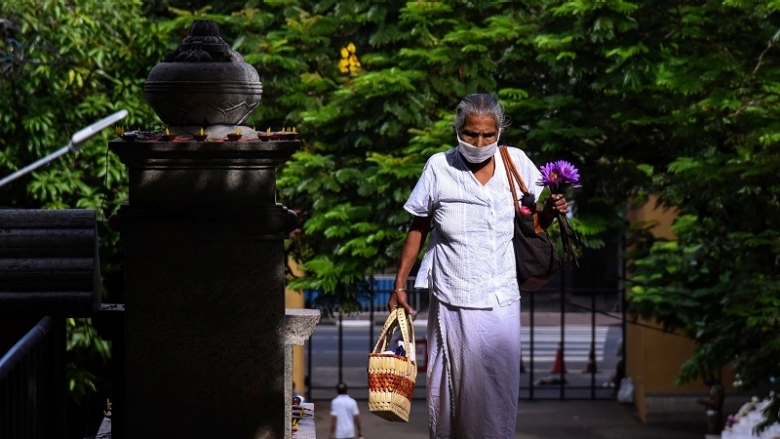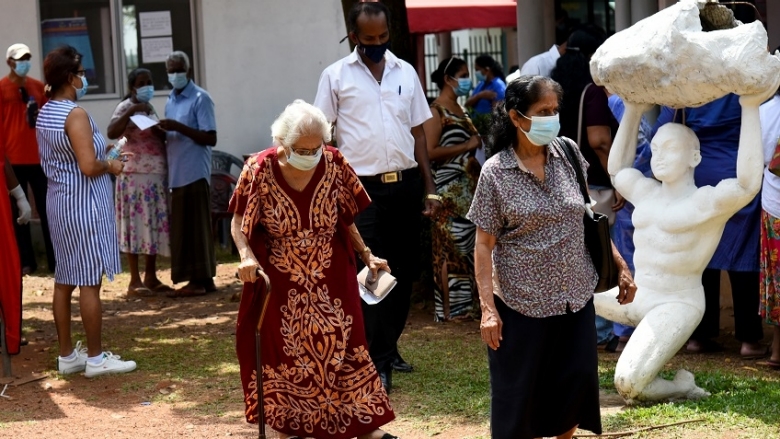Challenge
Sri Lanka was extremely vulnerable to the spread of COVID-19 because of its thriving tourism industry and large expatriate population. Since the detection of the first case in January 2020, Sri Lanka has successfully managed two waves of the pandemic, but is struggling to contain a third wave that began in April 2021.
The Government of Sri Lanka has implemented strict measures to curb the spread of the disease, and island-wide travel restrictions and isolation areas haven been imposed. With the third wave, efforts are focused on enforcing prevention measures, strengthening COVID-19 treatment facilities around the country, and deploying the COVID-19 vaccination program, particularly in high-risk areas and among vulnerable populations.
Already facing fiscal constraints, the pandemic placed additional resource demands on the country. The government worked with its development partners to take urgent action to mobilize resources to respond to the health and economic challenges posed by the pandemic.
Approach
In early 2020, the World Bank responded quickly to support Sri Lanka’s pandemic response by leveraging the dedicated COVID-19 Fast-Track Facility to mobilize resources and prepare the project in just 10 working days. Given the urgency, strategies and project priorities were built on gaps and needs outlined in the Health Disaster Preparedness, Response and Recovery plan that was being developed by the Ministry of Health (MoH) and development partners including the World Health Organization (WHO), the World Bank and Asian Development Bank (ADB). This allowed for swift preparation, while ensuring coordinated financing support by multiple partners.
The project adopted a flexible approach to respond to urgent needs, enabling reimbursement for routine goods and operating expenditures for facilities that were engaged in the COVID-19 response. This helped national and district level facilities quickly upgrade their wards to make them COVID-ready.
Longer-term activities to strengthen the country’s pandemic preparedness and response include establishing COVID-19 isolation and treatment facilities around the country, developing the existing laboratory system to improve and increase testing and diagnostic capacity, and strengthening the country’s infection control and surveillance systems.
Additional financing of $88.97 million enabled the project to scale-up social protection measures to vulnerable communities, including those who lost their livelihoods due to the lockdown.
An additional $80.5 million was provided to support vaccine procurement and deployment. World Bank financing is being used to procure 5 million doses of the Pfizer vaccine, arriving in batches from early July and to be completed by late 2021.

Results
Between May 2020 and August 2021, the project has contributed to the following results:
Progress made to date under the vaccination program:
- Bank funds have contributed to Sri Lanka’s vaccine deployment efforts, and supported the escalation of the vaccination drive. While the global shortage of vaccines and difficulties in receiving the expected quantities through the COVAX Facility initially slowed vaccination efforts, as of August 23, 2021, the government is approaching the full coverage of the population above 30 years old, with more than 95 percent having had one dose of the vaccine and 51 percent having two doses.
Results achieved during the emergency phase of the project:
- 1 million rapid antigen test kits, 390,000 PCR test kits, and 1.1 million sets of PPE were procured for hospitals.
- 26 cabs and 805 motorbikes have been procured for use by Medical Officers of the Health and Public Health Inspectors who are in charge of all grassroots-level health and COVID management activities. The additional vehicles increased capacity for contact tracing, testing, and follow up, as well as vaccine deployment activities.
- 70 intermediate care centers with isolation facilities are being refurbished or modified to handle COVID patients. Work on 56 of the centers has been completed and work on the remaining centers is ongoing.
- Work is in progress to strengthen four hospitals to function as Infectious Disease Hospitals (IDH) at the provincial level (Kilinochchi, Hambanthota, Ampara, and the National Institute of Infectious Diseases).
- Work is in progress to build/expand intensive-care units/facilities (ICU) in six hospitals (Rathnapura, Anuradhapura, Eheliyagoda, Warakapola, Marawila, and Balangoda) and to build/expand high-dependency units/facilities (HDU) in two hospitals (Pimbura and NIMH).
- 87 ICU/HDU beds have been supplied to increase the total national capacity of ICU/HDU beds to 650.
- 120 high-low nasal oxygen therapy units, 25 ICU ventilators, seven neonatal ventilators 20 transport ventilators, 2,100 Oxygen concentrators were procured through the United Nations Office of Project Services (UNOPS) and procurement of seven oxygen-generating plants is in progress.
Results achieved to date under the project’s cash transfer program:
- 629,303 elderly persons, 52,940 people with special needs, and 18,972 patients with chronic kidney disease were supported during the first wave of the pandemic.
- 1,338,422 beneficiaries who lost their livelihoods due to the lockdown received a one-time cash transfer of Rs. 5,000, and 417,427 beneficiaries sent on home quarantine received an in-kind transfer of food packs worth Rs. 5,000 for two weeks from October to December 2020.
Bank Group Contribution
The World Bank has provided $217.56 million in financing for the project. This includes a $35 million loan from the International Bank for Reconstruction and Development (IBRD), $180.84 million in concessional and non-concessional funding from the International Development Association (IDA), and a grant of $1.72 million from the Pandemic Emergency Financing Facility (PEFF). Additional financing of $88.97 million was approved in June 2020 to provide scaled-up social protection measures to vulnerable communities, and a second additional financing of 80.5million was approved in April 2021 to support vaccine procurement and deployment.
Partners
Sri Lanka’s COVID-19 management strategy is led by the Ministry of Health, and is implemented with support from a network of development partners including WHO, UNICEF and other United Nations agencies. The Bank has actively participated in the Emergency Health Cluster meetings, chaired by the WHO, and co-chairs the Health Development Partner Working Group, which is coordinating the medium- to long-term plans for health preparedness. UNICEF has also been contracted under the project to support the Ministry of Health in the procurement of essential medical consumables and PPEs.
The regular dialogue and coordination with the partner network have helped to prevent duplication and has enabled the Bank to identify the gaps in the country’s emergency response strategy and to address these gaps through the project. This is strengthened by the close working relationship with the Ministry of Health, established through the previous and ongoing projects including the Primary Health Care Systems Strengthening Project (PSSP).
A memorandum of understanding has been signed between the Government of Sri Lanka and UNICEF to implement risk communication activities under the project. The campaign carried out in collaboration with the Health Promotion Bureau (HPB) tracks public perception of COVID-appropriate behavior, vaccine hesitancy, news, and possible misinformation. A national media campaign was launched in May 2021 on national television and through social media to disseminate public information on infection prevention and control and safety protocols related to the resumption of daily activities. The campaign, which included short video clips, public service announcements, news segments, and animated advertisements, has reached approximately 15 million people through national television, and has recorded a reach of 5.3 million, with 1.6 million engagements on social media.
Moving Forward
Since 2004, the World Bank has funded two major health sector development projects in Sri Lanka, aimed at strengthening the health system service delivery, and quality of care, improving Emergency Treatment Unit (ETU) facilities, and preparing the system to respond to emerging health challenges. These investments have helped to strengthen the health service delivery network, which has been the cornerstone of Sri Lanka’s COVID-19 response strategy. Moving forward, the project will continue to develop emergency healthcare services at the secondary and tertiary levels, in line with national strategies and priorities, and will build capacities and establish emergency response systems, mechanisms and facilities that will benefit the population of Sri Lanka in years to come. The activities complement the ongoing Bank-funded Primary Healthcare System Strengthening Project (PSSP), which is working to strengthen primary healthcare. The COVID-19 project addresses health facilities beyond the primary care level, and in this way will support the continuum of care and overall health sector development plans financed by the government and development partners.
Beneficiaries
By strengthening the emergency response capacity of the public health system throughout the country, and by supporting the management of the pandemic, the COVID-19 project has and will continue to benefit the people of Sri Lanka and contribute to saving lives.
